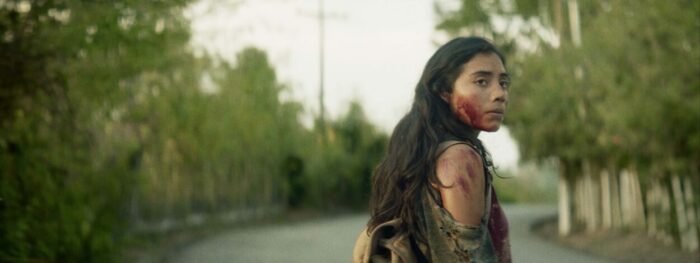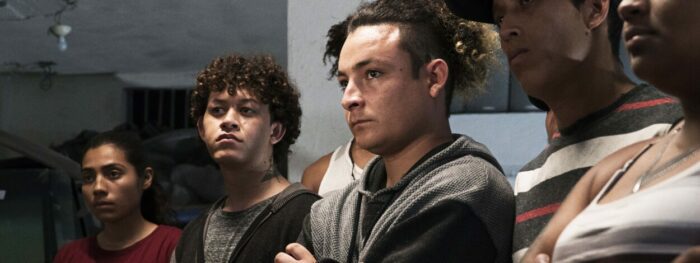Cadejo Blanco, a new thriller debuting in North America this week, takes its viewers on an immersive and gritty journey into the dangerous life of Guatemala’s clicas, its youth gangs, through the eyes of a young woman determined to find her missing sister. With its authentic cast of primarily non-professional actors and a verité approach to filming in the barrios, Cadejo Blanco makes for a timely, persuasive thriller, one largely without artifice and focused as intently as its protagonist on infiltrating a dangerous crime gang to solve its central mystery.
The film is directed by Justin Lerner (Girlfriend, The Automatic Hate), who was born and raised in the U.S. but has lived and taught in Guatemala part-time for years: his script for Cadejo Blanco was born of several years’ worth of interviews conducted with members of the clicas in Puerto Barrios, who described to him their loose-knit, less-than-organized criminal activities running drugs, trafficking women, and executing rivals. Those clicas can tend to assign, unlike gangs in other parts of Central America, significant authority and responsibility to women; from Lerner’s interviews came the story for Cadejo Blanco (one a bit reminiscent of the recent Mexican film La Civil), in which a young woman’s sister goes missing.
One of the few professional actors in the cast, Karen Martinez (a Cannes acting winner for The Golden Dream a decade ago) plays Sarita, a young woman who lives with her sister Bea (Pamela Martinez) in a working-class neighborhood in Guatemala City. Her father is in prison, and the two share their home with their grandmother. Bea is the more free-spirited of the two and drags Sarita to a club where her new boyfriend, Andrés (Rudy Rodríguez), a gang-connected bartender, works. But when the party drags on too long for the introverted Sarita, she takes her leave alone, and wakes to find Bea missing, with no clues left to her whereabouts.

Sarita suspects that Bea’s disappearance might have something to do with Andrés, with whom she saw Bea arguing. The police are wholly indifferent to her plight, so Sarita takes matters into her own hands: making herself over with Bea’s more provocative wardrobe and makeup, Sarita manages to befriend Andrés and slowly infiltrate the crime-laden underbelly of Puerto Barrios, a port city which also has the highest rate of violent crime and gang-related deaths in the country. While barely escaping with her own life on several occasions, Sarita becomes increasingly involved with Andrés, whose gang is even more ruthless and violent than she could have imagined. Alone and with no one to turn to, but determined to find her sister, Sarita is soon in so deep in Andrés’ world, escape seems impossible.
The film’s perspective keeps the audience equally as in the dark as Sarita: that is to say, we know no more than she knows. She is not certain Andrés is implicated, only suspicious. Once in his world, she has no contact on the outside. No one knows where she is or what she is doing. And she has no one to talk to. As Sarita, Martinez is an excellent young actor. Her resolve and determination are more convincing than the guile she she must adopt to infiltrate the gang. With her onscreen for nearly every second of the film, the film’s narrative depends almost entirely on the audience’s investment in her mission. Unfortunately, she has no way of conveying her thinking other than with facial expression, since there is no one in Andrés’ world to trust and no one on the outside with whom she can communicate. I can’t fault the acting, but I also can’t help but wonder if it wouldn’t help, at some point in the film’s nearly two-hour runtime, to know, somehow, what she thinks.

The film’s commitment to an authentic exploration of the Guatemalan barrios and the clicas who run in them is immersive and in every other sense persuasive. Karen Martinez is the only cast member playing a gang member who is a professional actor. Non-actor Rudy Rodríguez, who plays Andrés, worked at a local auto shop when he responded to an open call on his lunch break to tell Lerner of his history of gang affiliations and his violent past. Lerner then cast other current and former gang members in Puerto Barrios he had met during his research phase, many of them editing dialogue and suggesting scenes based on their experience. Brandon López, who plays Damian, is the one other professional actor of note in the cast, having played opposite Karen Martinez in The Golden Dream, when he was a non-actor responding to an open casting call.

Casting non-professional actors can have its advantages. Dozens of recent films, from Beautiful Beings to Tori and Lokita, benefit from the authentic representation of the peoples they depict—“street casting,” it’s called, nearly a commonplace in youth drama. But there are risks as well as rewards. In Dry Ground Burning, one of the two lead actors, a non-professional actor released from prison, finds herself once again arrested—and the film taking a significant turn as a consequence. The brilliantly metatextual The Worst Ones, meanwhile, takes the very nature of street casting as one of its key themes. One of Lerner’s Puerto Barrios cast members, Geobanny Alvarado, a valuable contributor to the film’s locations and dialogue, was tragically murdered just months after the shoot.
Any time an American director works in a foreign land, aiming to convey truths about the people depicted onscreen, it’s reasonable to question whether that representation is fair. Lerner, to his credit, has spent years in interviews, gainfully employed dozens of locals, established and taught at a film school in Guatemala (Escuela de Cine at Francisco Marroquin University in Guatemala City), and apparently made every effort to value the voices of his Guatemalan cast and crew in the creation of Cadejo Blanco. Most Western viewers will have little notion of the kinds of lives led in the barrios Cadejo Blanco represents, but Lerner’s thriller will take them on a dangerous, enthralling look into the gangs that operate there—and the resilience of a woman who challenges them.
Written and directed by Justin Lerner and starring Karen Martinez, Rudy Rodrigues, Brandon Lopez,
Pamela Martinez, and Juan Pablo Olyslager, Cadejo Blanco debuts in Los Angeles Friday, April 21, 2023, with other cities to follow. 125 minutes, in Spanish with English Subtitles.




